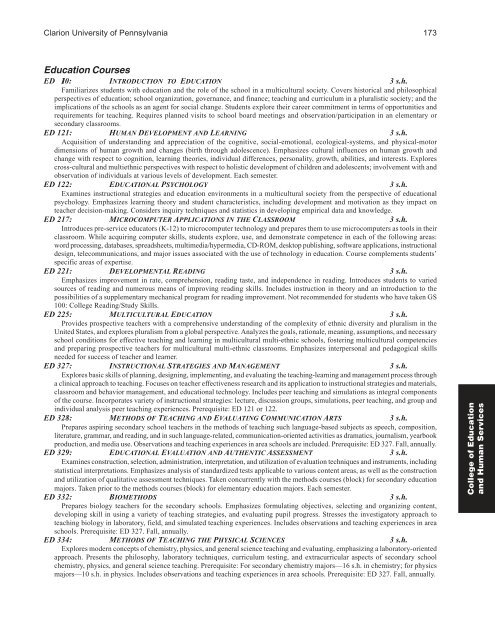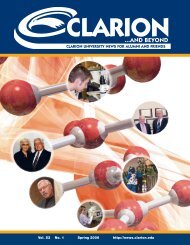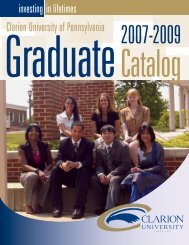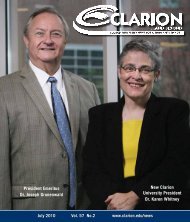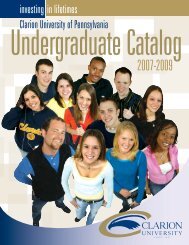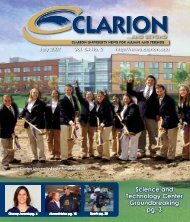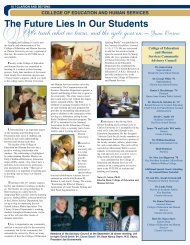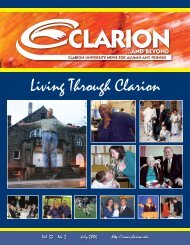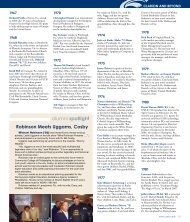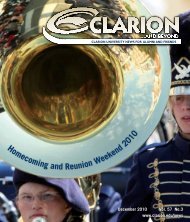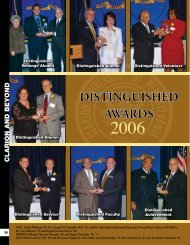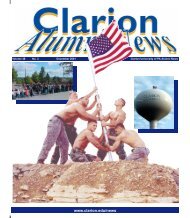Undergraduate - Clarion University
Undergraduate - Clarion University
Undergraduate - Clarion University
You also want an ePaper? Increase the reach of your titles
YUMPU automatically turns print PDFs into web optimized ePapers that Google loves.
<strong>Clarion</strong> <strong>University</strong> of Pennsylvania 173<br />
Education Courses<br />
ED 10: INTRODUCTION TO EDUCATION 3 s.h.<br />
Familiarizes students with education and the role of the school in a multicultural society. Covers historical and philosophical<br />
perspectives of education; school organization, governance, and finance; teaching and curriculum in a pluralistic society; and the<br />
implications of the schools as an agent for social change. Students explore their career commitment in terms of opportunities and<br />
requirements for teaching. Requires planned visits to school board meetings and observation/participation in an elementary or<br />
secondary classrooms.<br />
ED 121: HUMAN DEVELOPMENT AND LEARNING 3 s.h.<br />
Acquisition of understanding and appreciation of the cognitive, social-emotional, ecological-systems, and physical-motor<br />
dimensions of human growth and changes (birth through adolescence). Emphasizes cultural influences on human growth and<br />
change with respect to cognition, learning theories, individual differences, personality, growth, abilities, and interests. Explores<br />
cross-cultural and multiethnic perspectives with respect to holistic development of children and adolescents; involvement with and<br />
observation of individuals at various levels of development. Each semester.<br />
ED 122: EDUCATIONAL PSYCHOLOGY 3 s.h.<br />
Examines instructional strategies and education environments in a multicultural society from the perspective of educational<br />
psychology. Emphasizes learning theory and student characteristics, including development and motivation as they impact on<br />
teacher decision-making. Considers inquiry techniques and statistics in developing empirical data and knowledge.<br />
ED 217: MICROCOMPUTER APPLICATIONS IN THE CLASSROOM 3 s.h.<br />
Introduces pre-service educators (K-12) to microcomputer technology and prepares them to use microcomputers as tools in their<br />
classroom. While acquiring computer skills, students explore, use, and demonstrate competence in each of the following areas:<br />
word processing, databases, spreadsheets, multimedia/hypermedia, CD-ROM, desktop publishing, software applications, instructional<br />
design, telecommunications, and major issues associated with the use of technology in education. Course complements students’<br />
specific areas of expertise.<br />
ED 221: DEVELOPMENTAL READING 3 s.h.<br />
Emphasizes improvement in rate, comprehension, reading taste, and independence in reading. Introduces students to varied<br />
sources of reading and numerous means of improving reading skills. Includes instruction in theory and an introduction to the<br />
possibilities of a supplementary mechanical program for reading improvement. Not recommended for students who have taken GS<br />
100: College Reading/Study Skills.<br />
ED 225: MULTICULTURAL EDUCATION 3 s.h.<br />
Provides prospective teachers with a comprehensive understanding of the complexity of ethnic diversity and pluralism in the<br />
United States, and explores pluralism from a global perspective. Analyzes the goals, rationale, meaning, assumptions, and necessary<br />
school conditions for effective teaching and learning in multicultural multi-ethnic schools, fostering multicultural competencies<br />
and preparing prospective teachers for multicultural multi-ethnic classrooms. Emphasizes interpersonal and pedagogical skills<br />
needed for success of teacher and learner.<br />
ED 327: INSTRUCTIONAL STRATEGIES AND MANAGEMENT 3 s.h.<br />
Explores basic skills of planning, designing, implementing, and evaluating the teaching-learning and management process through<br />
a clinical approach to teaching. Focuses on teacher effectiveness research and its application to instructional strategies and materials,<br />
classroom and behavior management, and educational technology. Includes peer teaching and simulations as integral components<br />
of the course. Incorporates variety of instructional strategies: lecture, discussion groups, simulations, peer teaching, and group and<br />
individual analysis peer teaching experiences. Prerequisite: ED 121 or 122.<br />
ED 328: METHODS OF TEACHING AND EVALUATING COMMUNICATION ARTS 3 s.h.<br />
Prepares aspiring secondary school teachers in the methods of teaching such language-based subjects as speech, composition,<br />
literature, grammar, and reading, and in such language-related, communication-oriented activities as dramatics, journalism, yearbook<br />
production, and media use. Observations and teaching experiences in area schools are included. Prerequisite: ED 327. Fall, annually.<br />
ED 329: EDUCATIONAL EVALUATION AND AUTHENTIC ASSESSMENT 3 s.h.<br />
Examines construction, selection, administration, interpretation, and utilization of evaluation techniques and instruments, including<br />
statistical interpretations. Emphasizes analysis of standardized tests applicable to various content areas, as well as the construction<br />
and utilization of qualitative assessment techniques. Taken concurrently with the methods courses (block) for secondary education<br />
majors. Taken prior to the methods courses (block) for elementary education majors. Each semester.<br />
ED 332: BIOMETHODS 3 s.h.<br />
Prepares biology teachers for the secondary schools. Emphasizes formulating objectives, selecting and organizing content,<br />
developing skill in using a variety of teaching strategies, and evaluating pupil progress. Stresses the investigatory approach to<br />
teaching biology in laboratory, field, and simulated teaching experiences. Includes observations and teaching experiences in area<br />
schools. Prerequisite: ED 327. Fall, annually.<br />
ED 334: METHODS OF TEACHING THE PHYSICAL SCIENCES 3 s.h.<br />
Explores modern concepts of chemistry, physics, and general science teaching and evaluating, emphasizing a laboratory-oriented<br />
approach. Presents the philosophy, laboratory techniques, curriculum testing, and extracurricular aspects of secondary school<br />
chemistry, physics, and general science teaching. Prerequisite: For secondary chemistry majors—16 s.h. in chemistry; for physics<br />
majors—10 s.h. in physics. Includes observations and teaching experiences in area schools. Prerequisite: ED 327. Fall, annually.<br />
College of Education<br />
and Human Services


